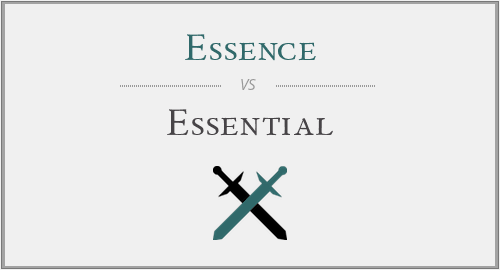Essence
Essence is a noun that refers to the quality of something that determines its uniqueness or character, or a gist of something. For example,
• The essence of this skit is women empowerment.
• Freedom is the essence of every democratic nation.
• The essence of the meeting was to work as a team and not fight amongst each other.
Essence also means extract of a plant to make scent or flavour for something. The most common example is the ‘vanilla essence’ that is put in almost every cake that a baker bakes.
• The perfume has a strong essence.
• These oils have soothing essence that can relieve your stress and headache.
The word essence originated from the Latin ‘essentia’.
A few common phrases using essence are –
of the essence – something that is of great importance, absolutely necessary.
• Time is of the essence for this test. Make sure you keep up to it.
• You must understand that time and accuracy both are of the essence for a critical mission like this.
Of the essence is same as using the word ‘crucial’ or ‘essential’.
in essence – at the peripheral or basic state/nature. For example, Artificial Intelligence can be a complex subject, but fundamentally or in essence it seems understandable and easy.
• In essence, when you talk things out directly, relations get better.

• In essence, he works hard though he may seem crazy.
In essence can be replaced by the word ‘essentially’. So, it is right to say – Essentially, he works hard though he may seem crazy.
Note that the word essence itself doesn’t mean essential, however as an idiom it can take the meaning of essential.
Essential
Essential is an adjective that means absolutely necessary, important or crucial – as we have seen with the idioms above. Essential can be used as a noun too to denote something that’s absolutely necessary.
For example –
• It is essential that you pay attention to each and every word I say.
• Water is essential for our brain to function properly.
• All these medicines are essential to cure this disease.
• Discipline is essential for a healthy and long life.
• Have you seen the essential qualifications to apply for the post?
• I feel it is essential to know each other more before taking the relationship to next level.
In essence, the main difference between both the words comes into picture when we use essence in the context of scent. Essential oils can come from any part of the plants and are beneficial from a health point of view. Essential oils can contain essence that is usually derived from oil of a flower. Both oils have healing and stress-relieving powers.
Hope the article has helped you learn two new words and a few phrases.








Have a discussion about this article with the community:
Report Comment
We're doing our best to make sure our content is useful, accurate and safe.
If by any chance you spot an inappropriate comment while navigating through our website please use this form to let us know, and we'll take care of it shortly.
Attachment
You need to be logged in to favorite.
Log In